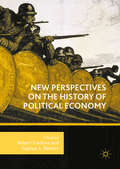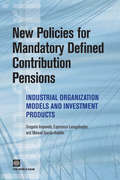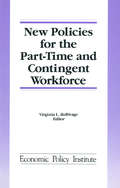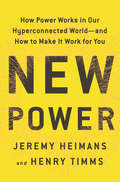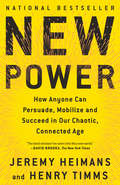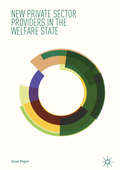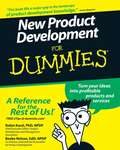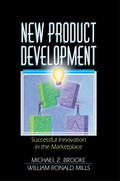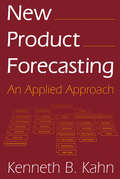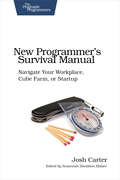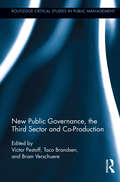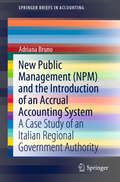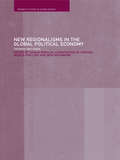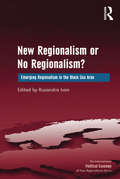- Table View
- List View
New Perspectives on the Bank-Firm Relationship: Lending, Management and the Impact of Basel III (Palgrave Macmillan Studies in Banking and Financial Institutions)
by Paola FerrettiThis book analyses the connections between the banking industry in Europe and the companies it finances. Ferretti specifically studies how these bonds have evolved over time and questions whether now is the time for a change in the relationship’s dynamics. Chapters discuss the role of bank lending in firms’ financing during the recent financial crisis, as well as issues in credit risk management. The discussion also examines regulatory requirements impacting banks and firms (Basel III) and how they intersect with banks’ internal purposes. Moreover, the book explores how the financial crisis has impacted the relationship between banks and businesses, and seeks to identify the strengths and weaknesses inherent to it. Through this timely discussion, Ferretti looks to the future of the relationship between banks and non-financial organizations to see how they can be revitalised, adapted and reimagined in a post-crisis economy.
New Perspectives on the History of Political Economy
by Sophus A. Reinert Robert FredonaThis volume offers a snapshot of the resurgent historiography of political economy in the wake of the ongoing global financial crisis, and suggests fruitful new agendas for research on the political-economic nexus as it has developed in the Western world since the end of the Middle Ages. New Perspectives on the History of Political Economy brings together a select group of young and established scholars from a wide variety of disciplinary backgrounds—history, economics, law, and political science—in an effort to begin a re-conceptualization of the origins and history of political economy through a variety of still largely distinct but complementary historical approaches—legal and intellectual, literary and philosophical, political and economic—and from a variety of related perspectives: debt and state finance, tariffs and tax policy, the encouragement and discouragement of trade, merchant communities and companies, smuggling and illicit trades, mercantile and colonial systems, economic cultures, and the history of economic doctrines more narrowly construed.The first decade of the twenty-first century, bookended by 9/11 and a global financial crisis, witnessed the clamorous and urgent return of both 'the political' and 'the economic' to historiographical debates. It is becoming more important than ever to rethink the historical role of politics (and, indeed, of government) in business, economic production, distribution, and exchange. The artefacts of pre-modern and modern political economy, from the fourteenth through the twentieth centuries, remain monuments of perennial importance for understanding how human beings grappled with and overcame material hardship, organized their political and economic communities, won great wealth and lost it, conquered and were conquered. The present volume, assembling some of the brightest lights in the field, eloquently testifies to the rich and powerful lessons to be had from such a historical understanding of political economy and of power in an economic age.
New Players in Mobility: Technische und betriebswirtschaftliche Aspekte
by Heike ProffBeim 16. Wissenschaftsforum Mobilität in Duisburg wurde im Juni 2024 über neue Anbieter in der Automobilindustrie und der Mobilitätsbranche diskutiert. Der Tagungsband enthält Beiträge an den Schnittstellen der betriebswirtschaftlichen und der ingenieurwissenschaftlichen Forschung, die dort präsentiert wurden. Dabei werden v.a. folgende Aspekte beleuchtet: New Players in Mobility Management New Players in Mobility Engineering Cities and their inhabitants – Influencing mobility New competition from IT and Asia Addressing and incentivizing customers
New Policies for Mandatory Defined Contribution Pensions: Industrial Organization Models and Investment Products
by Gregorio Impavido Manuel García-Huitrón Esperanza LasagabasterMandatory defined contribution pension markets are present in a growing number of countries around the world. But despite their popularity, policymakers continue to struggle with two key policy concerns. On the one hand, a number of design shortcomings encourages pension firms to charge high administrative fees. On the other hand, the global crisis that started in 2007 has reignited the debate on whether pension participants bear excessive investment risk. Both are valid policy concerns as their incidence can imply higher than expected levels of poverty among old age individuals. Both concerns have the same root problem---the limited capacity of individuals to choose what is best for them. This, in turn, stems from a combination of inadequate financial education, bounded rationality and the use of simplistic "rules of thumb" that produce systematic biases in the decision making process of individuals. While improving financial education is an obvious avenue to pursue, this book is more concerned with design features that can exploit these systematic biases to protect consumers from themselves. New Policies for Mandatory Defined Contribution Pensions: Industrial Organization Models and Investment Products (i) discusses the main implications for the functioning of mandatory defined contribution pensions of consumers' inability to make rational choices; (ii) it describes how jurisdictions have tried to address these problems through ad hoc policy interventions; and (iii) it proposes new policy directions in the areas of industrial organization models and investment products to address these concerns more effectively. Written for practitioners and researchers around the world, this book provides access to new thinking on mandatory defined contribution pension systems and it makes an important contribution to the on-going policy debate on how to best structure mandatory defined contribution pillars.
New Policies for the Part-time and Contingent Workforce (Economic Policy Institute Ser.)
by Virginia L. DuRivageWhile much attention has been focused on the rise of the modern Chinese nation, little or none has been directed at the emergence of "citizenry". This book examines thinkers from the period 1890-1920 in modern China, and shows how China might forge a modern society with a political citizenry.
New Political Spaces in Latin American Natural Resource Governance (Studies of the Americas)
by Håvard HaarstadCase studies written by anthropologists, geographers, political scientists, and sociologists provide empirical detail and analytical insight into states' and communities' relations to natural resource sectors, and show how resource dependencies continue to shape their political spaces.
New Power: How Power Works in Our Hyperconnected World--and How to Make It Work for You
by Jeremy Heimans Henry TimmsFrom two influential and visionary thinkers comes a big idea that is changing the way movements catch fire and ideas spread in our highly connected world.For the vast majority of human history, power has been held by the few. "Old power" is closed, inaccessible, and leader-driven. Once gained, it is jealously guarded, and the powerful spend it carefully, like currency. But the technological revolution of the past two decades has made possible a new form of power, one that operates differently, like a current. "New power" is made by many; it is open, participatory, often leaderless, and peer-driven. Like water or electricity, it is most forceful when it surges. The goal with new power is not to hoard it, but to channel it. New power is behind the rise of participatory communities like Facebook and YouTube, sharing services like Uber and Airbnb, and rapid-fire social movements like Brexit and #BlackLivesMatter. It explains the unlikely success of Barack Obama's 2008 campaign and the unlikelier victory of Donald Trump in 2016. And it gives ISIS its power to propagate its brand and distribute its violence. Even old power institutions like the Papacy, NASA, and LEGO have tapped into the strength of the crowd to stage improbable reinventions. In New Power, the business leaders/social visionaries Jeremy Heimans and Henry Timms provide the tools for using new power to successfully spread an idea or lead a movement in the twenty-first century. Drawing on examples from business, politics, and social justice, they explain the new world we live in--a world where connectivity has made change shocking and swift and a world in which everyone expects to participate.
New Power: How Power Works in Our Hyperconnected World--and How to Make It Work for You
by Jeremy Heimans Henry TimmsIn this indispensable guide to navigating the twenty-first century, two visionary thinkers reveal the unexpected ways power is changing--and how "new power" is reshaping politics, business, and life.Why do some leap ahead while others fall behind in our chaotic, connected age? In New Power, Jeremy Heimans and Henry Timms confront the biggest stories of our time--the rise of mega-platforms like Facebook and Uber; the out-of-nowhere victories of Obama and Trump; the unexpected emergence of movements like #MeToo--and reveal what's really behind them: the rise of "new power."For most of human history, the rules of power were clear: power was something to be seized and then jealously guarded. This "old power" was out of reach for the vast majority of people. But our ubiquitous connectivity makes possible a different kind of power. "New power" is made by many. It is open, participatory, and peer-driven. It works like a current, not a currency--and it is most forceful when it surges. The battle between old and new power is determining who governs us, how we work, and even how we think and feel. New Power shines fresh light on the cultural phenomena of our day, from #BlackLivesMatter to the Ice Bucket Challenge to Airbnb, uncovering the new power forces that made them huge. Drawing on examples from business, activism, and pop culture, as well as the study of organizations like Lego, NASA, Reddit, and TED, Heimans and Timms explain how to build new power and channel it successfully. They also explore the dark side of these forces: the way ISIS has co-opted new power to monstrous ends, and the rise of the alt-right's "intensity machine."In an era increasingly shaped by new power, this groundbreaking book offers us a new way to understand the world--and our role in it.
New Principles of Political Economy
by J.-C.-L. Simonde de SismondiAlthough Sismondi was admired for his analytic originality and imagination by Marx, Mill, and Schumpeter, until now there has been no full translation of his major work into English. Richard Hyse's excellent translation permits us to absorb the full flavor and quality of his thought. And as Robert Heilbroner notes in his foreword: "Perhaps even more useful is the commentary that precedes and accompanies the text . . . Hyse takes the reader on a conducted tour as he points out Sismondi's differences from, and criticisms of, Smith and Ricardo and Say, on the one hand, and Marx on the other."In many respects, Sismondi's thought was ahead of its time. A half-century before Walras, he spoke of aggregate "equilibrium." Fifty years before Marx, he devised an algebraic model of economic growth. Ten years before Mill he published an analytical criticism of Say's Law, and one of the earliest uses of marginal utility analysis to explain value. Schumpeter credited him as the father of dynamic analysis in the modern sense. He is also recognized by all as the pioneer of business cycle analysis.Richard Hyse's introduction adds valuable biographical information about Sismondi, and positions his work among eighteenth-century social and economic thinkers. As he notes, Sismondi's life spanned one of the most revolutionary periods in European history; and although Marxist theory clearly owes a debt to Sismondi, his preference was evolution, not revolution. The translation will illuminate the genesis of Marxist ideology and some of the basic causes of its failure. Publication of this translation will be welcomed by economists, social scientists interested in the history of ideas, and those who, in Hyse's words, wish to "follow the mind of a vigorous pamphleteer dealing with the turbulent world of the French Revolution and its lasting aftermath."
New Private Sector Providers in the Welfare State
by Jonas PieperThis book provides a study of the rise of private sector providers in the welfare state. It compares for-profit firms as providers of hospital services and pensions and investigates the new private actors in social policy provision, whether they become political actors, and the extent of their power in welfare state politics. Focusing on Germany and the UK, the author's analysis includes, amongst others, the surprising role of private sector firms in the National Health Service and the halting integration of financial sector companies in the German pension system. The book develops a novel measure of power resources with which to capture two dimensions of provider power: instrumental and structural resources. This important book sheds new light on the increasingly dominant role of markets in public policy provision by focusing on the supply side of these markets. Readers will learn about the drivers and contents of social policy reform, the interaction between business and politics and the politics of privatization. It will appeal to scholars and practitioners with an interest in public policy, comparative politics, welfare state reform and privatization.
New Product Commercialization: Common Mistakes
by V. Kasturi Rangan Kevin BartusAddresses the common mistakes made in new product development and launch. Many times customers' and suppliers' perceptions of the degree of product/market innovation do not match. One of them may view the innovations as a "breakthrough," but the other may view it only as an incremental improvement of an existing solution. Such a mismatch will inevitably lead to faculty commercialization. But even if the match is perfect, this note argues that breakthroughs and incremental new products require quite different new product development processes to enable commercial success.
New Product Development For Dummies
by Robin Karol Beebe Nelson Geoffrey NicholsonThe global consumer product market is exploding. In 2006 alone, 150,000 new products were brought to market. Now for the bad news: of those, fewer than 5% were hits, and fewer than 15% will even exist five years from now.Written for small business owners and entrepreneurs looking for an inside track on new product development, New Product Development for Dummies offers you a unique opportunity to learn from two consummate insiders the secrets of successfully developing, marketing and making a bundle from a new product or service. You learn proven techniques for sizing up market potential and divining customer needs. You get tested-in-the-trenches strategies for launching a new product or service. And you get a frank, in-depth appraisal of the most challenging issues facing new product developers today, including the need to collaborate with global partners, optimizing technology development for a 21st century marketplace, getting start-up capital in an increasingly competitive environment, and much more. Key topics covered include:Developing a winning NPD strategyGenerating bold new ideas for products and servicesUnderstanding what your customers really wantKeeping projects on track, on budget, and on-timeBuilding effective cross-functional teamsPlanning and executing a blockbuster launchCollaborating with global partnersMaximizing your chances for successNo matter what size or type of business you're in, this book provides you with an unbeatable competitive advantage in the booming global marketplace for new products and services.
New Product Development Imperative
by Steven C. Wheelwright Edward SmithIntroduces students to the best practices for managing new product development projects. Includes concepts and tools related to structuring teams consistent with the project objectives as well as concepts and processes for improving project execution.
New Product Development: Successful Innovation in the Marketplace
by Nicholas Mills Michael Z Brooke Erdener KaynakKeep ahead of your competitors!New Product Development will help you and your company overcome an expensive and common weakness: the lack of adequate new product development. This vital book examines the requirements of new product development in detail as well as in the context of corporate strategy. Packed with practical information that can immediately be put into effect, New Product Development can help you keep your company on the leading edge, no matter what type of industry you’re in!This uniquely insightful volume will help you become a successful innovator by showing you how to plan and execute strategies for developing a continuous flow of new products and services to help you stay ahead of the competition. It demonstrates how innovation, far from being a staff function, is a dynamic line management task. It calls for the same aggressive thrust as marketing and sales, and every officer of the company, from the president on down, has a share in this responsibility.Medium size, small, and even large companies constantly face a mass of problems in achieving successful innovation. New Product Development will help you deal with issues including: inaccurate budgeting costs exceeding budgets faulty market and technical research findings flaws in design inadequately durable materials unforeseen consumer rejection caused by the lack of proper consumer trials leakage of plans to competition failure by outside suppliers missed opportunities for cooperation with outside specialists poorly coordinated development staff ineffective leadership and much more!Beginning with an “executive summary” that will guide you quickly to the chapters most relevant to your business, this well-organized book should be on the shelf of every company officer who wants to see his firm prosper, innovate, and create new products that sell-now and for years to come!
New Product Forecasting: An Applied Approach
by Kenneth B. KahnConcise and jargon free, this is a one-step primer on the tools and techniques of forecasting new product development. Equally useful for students and professionals, the book is generously illustrated, and features numerous current real-world industry cases and examples. Part I covers the basic foundations and processes of new product forecasting, and links forecasting to the broader processes of new product development and sales and operations planning. Part II includes detailed, step-by-step techniques of new product forecasting, from judgmental techniques to regression analysis. Each chapter in this section begins with the most basic techniques, then progresses to more advanced levels. Part III addresses managerial considerations of new product forecasting, including postlaunch issues such as cannibalization and supercession. The final chapter presents an important set of industry best practices and benchmarks.
New Profit, Inc.: Governing the Nonprofit Enterprise
by Robert S. KaplanNew Profit, Inc. (NPI) is an innovative venture philanthropy fund. Founded by social entrepreneur Venessa Kirsch, NPI intends to raise large donations from individuals who wish to invest in nonprofit enterprises that could have a significant social impact and the capability to grow to scale. NPI searches and identifies such organizations, provides initial funding, monitors their performance, and then provides additional funding to enable them to become high-impact, nationwide organizations. NPI uses the Balanced Scorecard approach for measuring both its own performance and that of its portfolio companies. The Balanced Scorecard provides the language for the performance contract between NPI and its funders and board, and between NPI and its portfolio organizations.
New Programmer's Survival Manual: Navigate Your Workplace, Cube Farm, or Startup
by Joshua D. CarterIt's your first day on the new job. You've got the programming chops, you're up on the latest tech, you're sitting at your workstation... now what? New Programmer's Survival Manual gives your career the jolt it needs to get going: essential industry skills to help you apply your raw programming talent and make a name for yourself. It's a no-holds-barred look at what really goes on in the office--and how to not only survive, but thrive in your first job and beyond.Programming at industry level requires new skills - you'll build programs that dwarf anything you've done on your own. This book introduces you to practices for working on large-scale, long-lived programs at a professional level of quality. You'll find out how to work efficiently with your current tools, and discover essential new tools.But the tools are only part of the story; you've got to get street-smart too. Succeeding in the corporate working environment requires its own savvy. You'll learn how to navigate the office, work with your teammates, and how to deal with other people outside of your department. You'll understand where you fit into the big picture and how you contribute to the company's success. You'll also get a candid look at the tougher aspects of the job: stress, conflict, and office politics.Finally, programming is a job you can do for the long haul. This book helps you look ahead to the years to come, and your future opportunities--either as a programmer or in another role you grow into.There's nothing quite like the satisfaction of shipping a product and knowing, "I built that." Whether you work on embedded systems or web-based applications, in trendy technologies or legacy systems, this book helps you get from raw skill to an accomplished professional.
New Public Governance, the Third Sector, and Co-Production (Routledge Critical Studies in Public Management)
by Taco Brandsen Bram Verschuere Victor PestoffIn recent years public management research in a variety of disciplines has paid increasing attention to the role of citizens and the third sector in the provision of public services. Several of these efforts have employed the concept of co-production to better understand and explain this trend. This book aims to go further by systematizing the growing body of academic papers and reports that focus on various aspects of co-production and its potential contribution to new public governance. It has an interdisciplinary focus that makes a unique contribution to the body of knowledge in this field, at the cross-roads of a number of disciplines - including business administration, policy studies, political science, public management, sociology, third sector studies, etc. The unique presentation of them together in this volume both allows for comparing and contrasting these different perspectives and for potential theoretical collaboration and development. More particularly, this volume addresses the following concerns: What is the nature of co-production and what challenges does it face? How can we conceptualize the concept of co-production? How does co-production works in practice? How does co-production unfold in reality? What can be the effects of co-production? And more specific, firstly, how can co-production contribute to service quality and service management in public services, and secondly, what is the input of co-production on growing citizen involvement and development of participative democracy?
New Public Management in Africa: Contemporary Issues (Palgrave Studies of Public Sector Management in Africa)
by Justice Nyigmah Bawole Ogechi Adeola Robert E. Hinson Isaiah Adisa Nnamdi Madichie Kwame AsamoahThis book analyses and evaluates the accomplishments, challenges, and approaches associated with the New Public Management (NPM) in Africa towards establishing context-specific interventions for public sector institutions' performance. Taking the reader through various business and management approaches, including leadership in the public sector, digitalisation, market orientation and trust building, this book provides an understanding of the key issues facing public sector organisations in Africa and offers novel ways of approaching public management in a changing socio-economic landscape to drive improved performance of public institutions.The book offers students, practitioners and researchers important insights on NPM and public sector institutions in Africa. The recommendations of the book will help government and policymakers implement appropriate public sector management policies for strengthening public sector service delivery in Africa.
New Public Management: A Case Study of an Italian Regional Government Authority (SpringerBriefs in Accounting)
by Adriana BrunoIn recent decades, the dissemination and the adoption of new public management (NPM) have been significant within the new public sector. One key innovation is the adoption of accrual accounting from business enterprise. The unresolved question is, what does accrual accounting mean in practice for government? This book analyzes the initial stage of development of an accrual accounting system in the context of regional government in Italy. It presents the accrual accounting system as a new technology and contributes to understanding of neutral tools involved in a public sector reform.
New Public Management: Current Trends and Future Prospects
by Ewan Ferlie Kathleen McLaughlin Stephen Osborne PThe UK has played a pivotal role in the development of New Public Management (NPM). This book offers an original, comprehensive and multidisciplinary analysis of the impact of the New Public Management in the UK, and situates these analyses in a broader comparative perspective. Its chapters consider: competing typologies of NPM issues of professionalism within NPM debates on social exclusion and equity the role of different research approaches in evaluating NPM the evolving nature of NPM and impact of modernisation evaluations of NPM in mainland Europe, North America, Africa and the developing World, Australia, and Pacific-Asia. Leading authorities from around the world present evaluations of current thinking in NPM and highlight the challenges which will shape future development and research approaches. New Public Management presents a timely and constructive overview of the nature and impact of the NPM and offers important lessons for public management across the world.
New Queer Sinophone Cinema
by Zoran Lee PecicThis book looks closely at some of the most significant films within the field of queer Sinophone cinema. Examining queerness in films produced in the PRC, Taiwan and Hong Kong, the book merges the Sinophone with the queer, theorising both concepts as local and global, homebound as well as diasporic. Queerness in this book not only problematises the positioning of non-normative desires within the Sinophone; it also challenges Eurocentric critical perspectives on filmic representation that are tied to the idea of the binary between East/West. New Queer Sinophone Cinema will appeal to scholars in Chinese and film studies, as well as to anyone who is interested in queer Chinese cinema.
New Regional Initiatives in China’s Foreign Policy: The Incoming Pluralism Of Global Governance
by Matteo Dian Silvia MenegazziThis book offers a theoretically informed study of recent Chinese initiatives to provide forms of regional economic governance; or as it is often termed in Chinese discourses, regional “public goods”. It does so by considering the evolution of Chinese thinking on international relations and the global order, and by considering how the development of the Asian Infrastructure Investment Bank, the Belt and Road Initiative, and the putative Regional Comprehensive Economic Partnership reflect this change in thinking – and the change in both Chinese objectives and tactics.
New Regionalism in the Global Political Economy: Theories and Cases (Warwick Studies In Globalisation Ser.)
by Nicola Phillips Christopher W. Hughes Ben Rosamond Shaun BreslinFollowing the financial crisis at the end of the twentieth century, regionalisms in the global political economy have evolved in a number of ways. This informative book brings together the leading scholars in the field to provide cutting edge analyses of contemporary regions and regionalist projects.Providing an innovative integration of theoretica
New Regionalism or No Regionalism?: Emerging Regionalism in the Black Sea Area (The International Political Economy of New Regionalisms Series)
by Ruxandra IvanThe nation states in the Black Sea area have initiated many co-operative policies but the area also sees numerous tensions between neighboring states. The conflict-co-operation paradox, along with ethnic fragmentation and shared culture, are two of the most salient features of the Black Sea Area. These paradoxes are not the only force in the evolution of the region though. There are also issues such as ethnic and national identity, the failure of democratization, energy and resources, as well as the influence of other powers such as Russia, the EU and the USA. The key questions asked by the authors in this book are: to what extent is there an emerging regionalism in the Black Sea area? Is the Black Sea a region? What are the common interests shared by the former USSR states, the three EU member states neighboring the Black Sea - Bulgaria, Greece and Romania, and a NATO country - Turkey? Are the fault-lines dividing them more pervasive than the incentives for cooperation? Can we speak of a shared identity? The first part of the book places the Black Sea problematique in a wider historical and spatial context. The authors then take a closer look at the region and examine further the structure of the Black Sea area. They offer a perspective on smaller actors with great ambitions, such as Azerbaijan and Romania, and go on to make a comparison between the emerging regionalism in the Black Sea area and regionalisms in other parts of the world.

